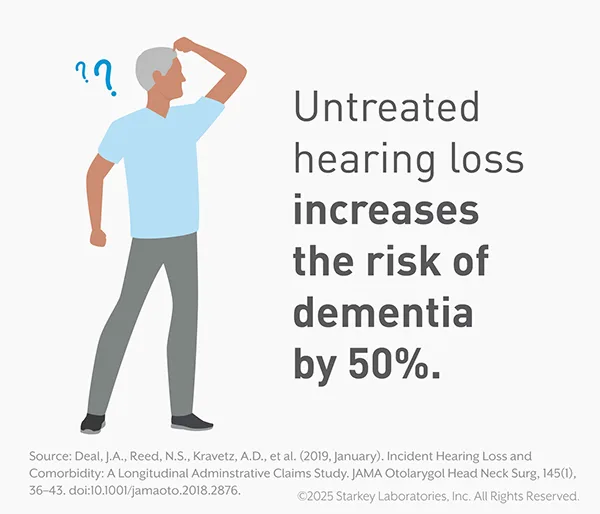Perhaps one of the most significant dangers of hearing loss is how easy it is to go undetected and untreated. In most cases, hearing loss occurs gradually and for many with hearing loss, it often takes a long time for them to confront the fact that they have a problem or need help. According to the Hearing Loss Association of America (HLAA), it takes the average person 7 years to seek treatment. Here at Acute Hearing, we think waiting 7 years to tackle untreated hearing loss is 7 years too late. Here’s why.
Consequences of Untreated Hearing Loss
Untreated hearing loss is not some mere inconvenience; it affects almost every aspect of life. Everything from simple conversations, listening to music or movies, and even performing everyday chores can quickly become frustrating and overwhelming with hearing loss. Even more concerning, studies show that hearing loss has a direct impact on our mental and emotional wellbeing.1
Hearing loss impacts daily activities
For many, hearing plays a key role in our ability to function day-to-day: it lets us converse with others; it helps us enjoy music, movies and nature; it informs us of danger. For individuals with untreated hearing loss, losing this vital sense can profoundly impact even the most basic daily activity.
Communication
Untreated hearing loss can make even small talk difficult thanks to increased misunderstandings, missing words and lack of tonal nuance.
Independence
Everyday tasks like making phone calls, driving and following verbal instructions can become challenging. As a result, living on your own becomes less and less possible.
Safety
Missing out on crucial auditory warnings like sirens, alarms, alerts and even verbal signals can significantly impact your safety and the safety of those around you.
Untreated hearing loss fuels social isolation and loneliness
Humans are social creatures, and communication plays a vital role in maintaining our communal connections. But not being able to hear effectively can strain relationships with friends and family and make communication increasingly difficult. And over time, untreated hearing loss can affect and quality and quantity of our social connections.
Stress and anxiety
Hearing loss puts significant strain on our brains to fill in the gaps caused by hearing loss. This additional strain can cause mental fatigue and even diminish the functionality of other parts of our brains.
Self-esteem
For some, hearing loss can cause embarrassment and/or shame. While there is nothing shameful about hearing loss, these feelings can create a sense of inadequacy and contribute to negative self-perception.
Isolation and depression
Untreated hearing loss can make even the simplest of interactions socially awkward, which can be disheartening and exhausting. Oftentimes, people with untreated hearing loss start to forego socializing altogether.
Hearing loss affects mental and emotional health
We all want to maintain our mental sharpness as we get older. But untreated hearing loss can negatively impact how our brains function as were age. In fact, untreated hearing loss can accelerate cognitive decline and increase the risk of dementia and Alzheimer’s.

Dementia
Hearing loss is the largest treatable risk factor2 for dementia. In fact, researchers of one study conclude that up to 9% of dementia cases could be prevented with proper hearing loss treatment3.
Mental fatigue
Struggling to hear the people and sounds around you can cause undue stress on your brain. This extra mental effort can cause brain fatigue and lower cognitive function as your brain diverts energy away from other processes to make up for the sounds it’s missing.
Brain tissue atrophy
While our brains naturally shrink over time, untreated hearing loss can actually accelerate brain tissue atrophy4 due to the lack of auditory stimulation and processing.
Act Today! Treat Your Hearing Loss Before It’s Too Late
Addressing hearing loss is more than just hearing better; it’s also living a better, more fulfilling life. Untreated, hearing loss can leave you feeling frustrated, overwhelmed, disconnected and fatigued.
At Acute Hearing, our team of dedicated hearing specialists are ready to help get you back on the path to better hearing and better living. Take your first step with us today.
If you’re ready to take your hearing health seriously, schedule an appointment today.
Not quite sure if you have hearing loss? We offer a FREE online hearing test you can take in the comfort of your own home.
- John Hopkins Bloomberg School of Public Health. Hearing Loss and the Dementia Connection. https://publichealth.jhu.edu/2021/hearing-loss-and-the-dementia-connection?_gl=1*rtkyns*_gcl_au*MzY4MTQwMDYxLjE3MTI2ODk2NzI.
- Prof Gill Livingston, MD; Jonathan Huntley, PhD; Andrew Sommerlad, PhD; Prof David Ames, MD; Prof Clive Ballard, MD; Prof Sube Banerjee, MD; et al. Dementia Prevention, Intervention, and Care: 2020 Report of the Lancet Commission. helancet.com. https://www.thelancet.com/article/S0140-6736(20)30367-6/fulltext?_gl=1*pnqor8*_gcl_au*MzY4MTQwMDYxLjE3MTI2ODk2NzI.#:~:text=Hearing%20loss%20had%20the%20highest%20PAF%20for%20dementia https://www.thelancet.com/article/S0140-6736(20)30367-6/fulltext?_gl=1*pnqor8*_gcl_au*MzY4MTQwMDYxLjE3MTI2ODk2NzI.#:~:text=45%E2%80%9365%20years)-,Hearing%20loss,-1%C2%B79%20(1
- Livingston G, Sommerlad A, Orgeta V, et al. Dementia Prevention, Intervention, and Care. Lancet North Am Ed. 2017; 390(10113):2673‐2734. https://www.thelancet.com/journals/lancet/article/PIIS0140-6736(17)31363-6/abstract
- Nicole M. Armstrong, PhD; Yang An, MS; Jimit Doshi, MS; et al. Association of Midlife Hearing Impairment with Late-life Temporal Lobe Volume Loss. Jamanetwork.com. https://jamanetwork.com/journals/jamaotolaryngology/article-abstract/2737210?_gl=1*1ilq6s4*_gcl_au*MzY4MTQwMDYxLjE3MTI2ODk2NzI.
